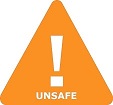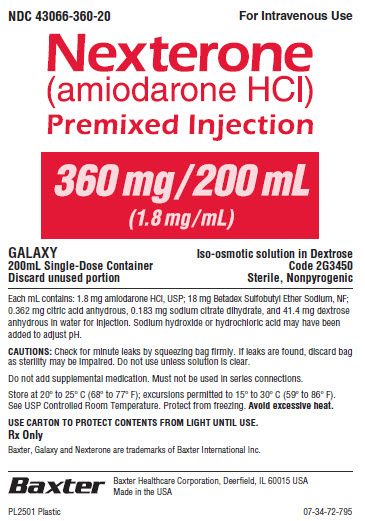
Nexterone | Amiodarone Hydrochloride Injection while Breastfeeding
What is Nexterone | Amiodarone Hydrochloride Injection used for?
I am currently breastfeeding and I want to know if using Nexterone | Amiodarone Hydrochloride Injection is safe for my kid? Does it have any effect on milk production?

8.3 Nursing Mothers Amiodarone and one of its major metabolites, desethylamiodarone (DEA), are excreted in human milk, suggesting that breast-feeding could expose the nursing infant to a significant dose of the drug. Nursing offspring of lactating rats administered amiodarone have demonstrated reduced viability and transient reduced body weight gains. The risk of exposing the infant to amiodarone and DEA must be weighed against the potential benefit of arrhythmia suppression in the mother. Advise the mother to discontinue nursing.
Nexterone | Amiodarone Hydrochloride Injection Breastfeeding Analsys
Amiodarone hydrochloride while Breastfeeding
UnsafeCAS Number: 1951-25-3
A published case of infant hypothyroidism. Others have reported lab controlled cases with harmless effect in breastfed babies.
Nexterone | Amiodarone Hydrochloride Injection Breastfeeding Analsys - 2
Amiodarone hydrochloride while Breastfeeding
CAS Number: 1951-25-3
Breastmilk and infant serum levels of amiodarone and its active metabolite are somewhat unpredictable, but can be high during breastfeeding. The infant receives an estimated dose of amiodarone plus desethylamiodarone ranging from 3.5 to 45% of the mother's weight-adjusted amiodarone dose, with a median dose of about 11%.[1][2][3][4] Infant serum levels of the drug plus metabolite range from 14 to 74% of simultaneous maternal levels, with the higher values reflecting transplacental passage of the drug.[2][3][4] In addition to possible cardiac effects, these compounds contain a large amount of iodine which may be released during metabolism. Thyroid dysfunction was reported in one breastfed infant. Even if the drug were discontinued at birth, the mother would continue to excrete amiodarone and its metabolite (and possibly large amounts of iodine) into breastmilk for days to weeks. Some investigators believe that breastfeeding can be undertaken during maternal amiodarone use with periodic monitoring of infant cardiac and thyroid function status,[5][6] especially if only a single dose of amiodarone is given.[7] Infant serum levels of amiodarone and desethylamiodarone may be useful for ruling out cardiac effects of the drug. If hypothyroidism develops, therapy should be promptly initiated.

What should I do if already breastfed my kid after using Nexterone | Amiodarone Hydrochloride Injection?
If you observer abnormal behavior or any other health issue in infant then you should immediately call 911 or contact other contact other emergency service provider in your area otherwise closely monitor the baby and inform your doctor about your Nexterone | Amiodarone Hydrochloride Injection usage and time interval of breastfeeding.
My health care provider has asked me to use Nexterone | Amiodarone Hydrochloride Injection, what to do?
If your doctor knows that you are breastfeeding mother and still prescribes Nexterone | Amiodarone Hydrochloride Injection then there must be good reason for that as Nexterone | Amiodarone Hydrochloride Injection is considered unsafe, It usually happens when doctor finds that overall advantage of taking
If I am using Nexterone | Amiodarone Hydrochloride Injection, will my baby need extra monitoring?
Yes, Extra monitoring is required if mother is using Nexterone | Amiodarone Hydrochloride Injection and breastfeeding as it is considered unsafe for baby.
Who can I talk to if I have questions about usage of Nexterone | Amiodarone Hydrochloride Injection in breastfeeding?
US
National Womens Health and Breastfeeding Helpline: 800-994-9662 (TDD 888-220-5446) 9 a.m. and 6 p.m. ET, Monday through Friday
UK
National Breastfeeding Helpline: 0300-100-0212 9.30am to 9.30pm, daily
Association of Breastfeeding Mothers: 0300-330-5453
La Leche League: 0345-120-2918
The Breastfeeding Network supporter line in Bengali and Sylheti: 0300-456-2421
National Childbirth Trust (NCT): 0300-330-0700
Australia
National Breastfeeding Helpline: 1800-686-268 24 hours a day, 7 days a week
Canada
Telehealth Ontario for breastfeeding: 1-866-797-0000 24 hours a day, 7 days a week
